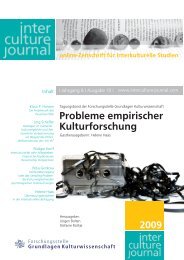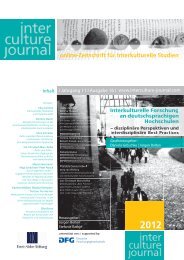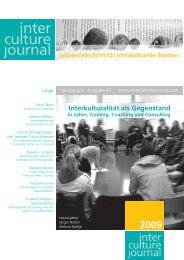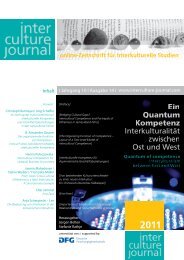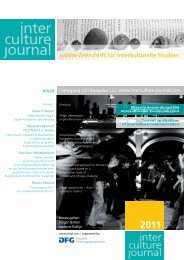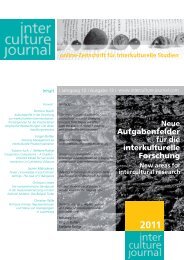Interkulturellen Kompetenz forschung - Frankfurt School of Finance ...
Interkulturellen Kompetenz forschung - Frankfurt School of Finance ...
Interkulturellen Kompetenz forschung - Frankfurt School of Finance ...
Sie wollen auch ein ePaper? Erhöhen Sie die Reichweite Ihrer Titel.
YUMPU macht aus Druck-PDFs automatisch weboptimierte ePaper, die Google liebt.
International English and<br />
the Training <strong>of</strong> Intercultural<br />
Communicative<br />
Competence<br />
[”International English”<br />
und interkulturelle <strong>Kompetenz</strong>]<br />
Judith Mader<br />
M.A., Head <strong>of</strong> Languages <strong>Frankfurt</strong><br />
<strong>School</strong> <strong>of</strong> <strong>Finance</strong> and Management<br />
Rudi Camerer<br />
PHD, elc – European Language<br />
Competence, <strong>Frankfurt</strong>/Main<br />
Mader / Camerer: International English and the Training <strong>of</strong> Intercultural Communicative Competence<br />
Abstract [english]<br />
Training students in the use <strong>of</strong> appropriate discourse strategies,<br />
e.g. in International English, may do more to encourage<br />
intercultural understanding than focussing on cognitive and<br />
personality-oriented methods prevalent in many intercultural<br />
training concepts. The paper is based on curricula and training<br />
material developed both for German secondary schools<br />
and for chambers <strong>of</strong> commerce in Germany and Austria.<br />
Keywords: intercultural competence, international English,<br />
discourse strategies, politeness conventions, criteria for intercultural<br />
competence<br />
Abstract [deutsch]<br />
Interkulturell angemessene Diskursstrategien in der Fremdsprache<br />
zu vermitteln, z.B. in ”International English”, dürfte<br />
mehr zur Herausbildung interkultureller <strong>Kompetenz</strong>en beitragen,<br />
als vorwiegend kognitive und persönlichkeitsbezogene<br />
Übungsformen, wie sie in zahlreichen interkulturellen Trainingskonzepten<br />
zu finden sind. Der Beitrag nimmt Bezug auf<br />
Curricula und Trainingsmaterialien, die für Fremdsprachenschüler<br />
deutscher Sekundarschulen und für Zertifikatslehrgänge<br />
von Industrie- und Handelskammern in Deutschland<br />
und Österreich entwickelt wurden.<br />
Stichworte: interkulturelle <strong>Kompetenz</strong>, Englisch als Lingua<br />
Franca, Diskursstrategien, Höflichkeitskonventionen, Kriterien<br />
interkultureller <strong>Kompetenz</strong><br />
1. Basic Questions Revisited: Culture and Language<br />
There is no doubt that language and culture are inextricably<br />
connected (Whorf 1962, Gumperz 1982, Gipper 1987,<br />
Geertz 1993, Ochs 2005), but how many intercultural training<br />
concepts effectively develop the trainees’ intercultural<br />
communicative competence? Does knowing about the findings<br />
<strong>of</strong> H<strong>of</strong>stede and Trompenaars, being able to define lowcontext<br />
cultures, collectivist societies, or being open-minded,<br />
sensitive and able to work under pressure make a person a<br />
competent communicator in intercultural encounters? What<br />
role does language play in intercultural encounters? Why is<br />
language so rarely mentioned by many interculturalists?<br />
Looking at these questions from the point <strong>of</strong> view <strong>of</strong> relevant<br />
criteria, as test experts (which we are) would, we have <strong>of</strong>ten<br />
been disappointed by the training and testing tools available.<br />
It is for this reason that we have chosen a different strategy<br />
for developing a training and testing concept for intercultural<br />
97 © Interculture Journal 2010 | 12



